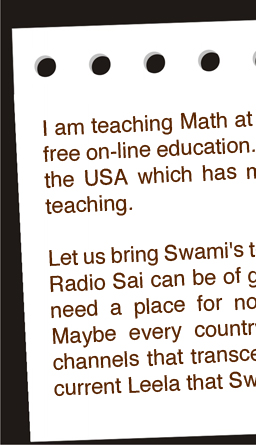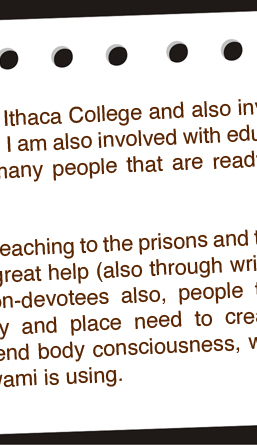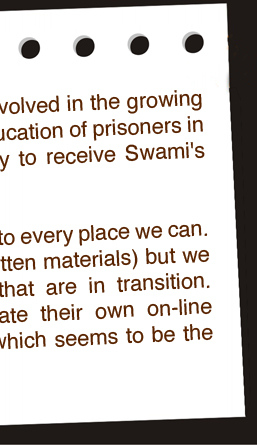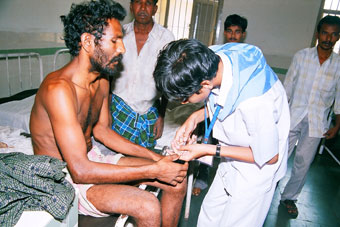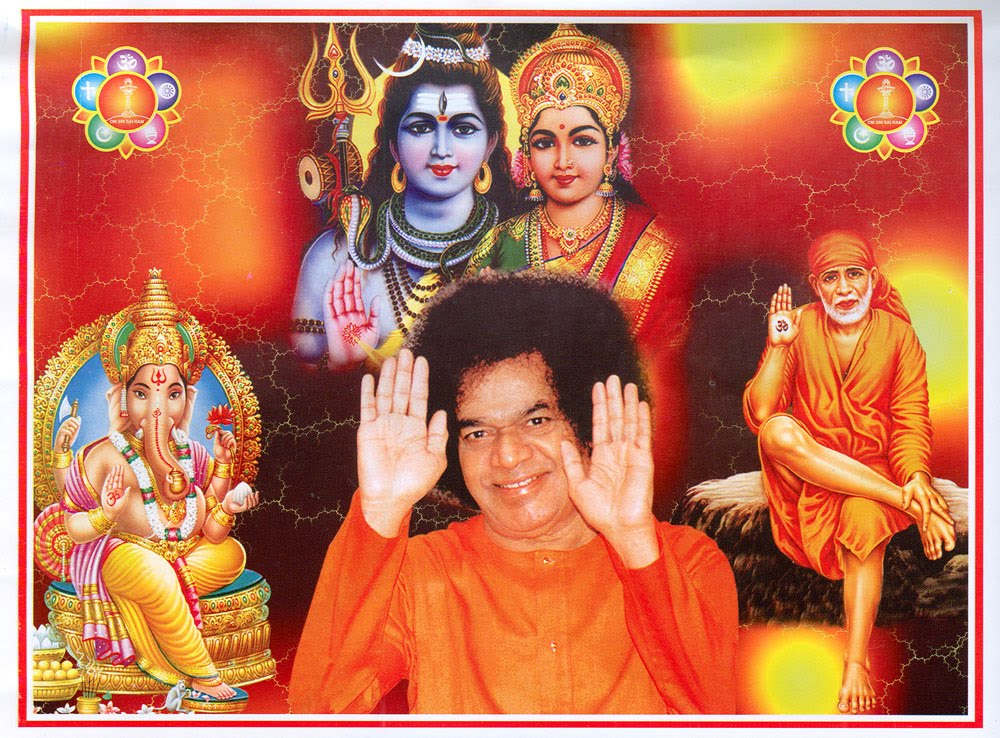WHY WE SHOULD SPREAD THE FRAGRANCE OF PURE LOVE?
Musings by Prof. G. Venkataraman
This is the transcript of a radio talk suitably adapted for H2H wherein Prof. Venkataraman reiterates the supreme importance of taking Bhagawan Baba's message to the larger humanity out there which needs it the most. Citing how crime and punishment, which unfortunately receive prime space and time in all forms of media in the current times, is often terribly mismanaged and in the process often enhanced instead of being mitigated, the author goes on to pin down the exact root of this problem, and then offers solutions based on Baba's teachings. In the end, he also urges one and all to join hands in spreading the fragrance of Divine Love.
At the outset, I would like to offer my humble pranams to our most beloved Bhagavan.
Loving Sai Ram and greetings from Prashanti Nilayam. Let me begin by thanking all readers who took the suggestions made in my earlier article quite seriously, and wrote back with positive offers of active co-operation as well as specific suggestions. I feel truly humbled and am deeply grateful for the responses. So much so, I tried to follow-up with an elaborate essay which might be called a kind of a Vision Document or a Manifesto, about where Radio Sai could go from here. While I await responses to that rather lengthy reflection from my side, let me devote this musings to other matters. To be more specific, I wish to start with a wonderful mail I received from Mr. Dani Kovak in America. It was so touching and heart-warming that I am taking the liberty of placing that here for you; I trust Dani would not mind. 'Dani, I do hope you will see this. I am so happy you are working with prisoners, because it is such a wonderful service that you are doing.' Here is what Dani says in part:
That was Dani's mail. I am sharing it with all of you because I wish to say something about prisoners and working with them. Now I do not claim to be an expert on crime and punishment, and I certainly have not read Dostoyevsky's famous book on the subject. However, that does not prevent me from raising some basic questions and bringing some points to your notice.
Crime is as old as human society, and all over the world they have evolved ways of tackling crime as well as punishing the convicted criminals. In course of time, these methods have understandably undergone change. In earlier times, punishment was often excessive besides being brutal. The Old Testament, for example, talks of an eye for an eye and a tooth for a tooth. Often it used to be the case that punishment was far in excess of what the crime required. However, as societies advanced, the issue of crime and punishment was critically re-examined in many countries, resulting in major reforms. Thus the debtors' prisons famous from the novels of Dickens, for example, no longer exist. In recent decades, many countries have abolished the death penalty. In some countries, punishment for small crimes, especially of a non-violent nature, includes a dose of compulsory social service, while torture by police is explicitly prohibited by law in many countries. In addition to all this, there have also been serious discussions on the extent to which the state and society are themselves responsible for the growth of crime. Let me give an example.
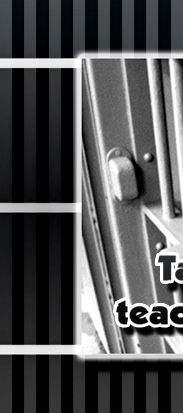 | 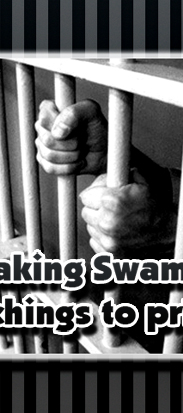 | 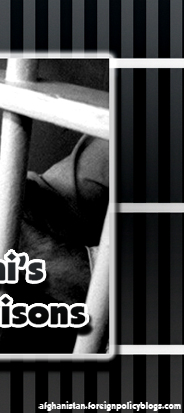 |
A few years ago, I heard on the BBC a discussion about a Royal Commission set up to enquire into the brutalisation of juvenile offenders. The problem the Commission was inquiring into was the following: Now it often happens that people below 18 years of age commit crimes. According to law, a person below the age of 18 is to be regarded as a child, especially because the brain is not supposed to have become fully developed by then. As such, young people might not always be clearly aware of the nature of their actions, and crimes if any committed by them would have to be dealt with separately. So far so good. But what happens in practice is often different, and when such deviations occur on a large scale, there are disturbing consequences that affect society as a whole. That precisely was what was happening in Britain, and the job of the Royal Commission was to find out what was going wrong and where.
The Commission did a thorough job and what it found is more or less what goes on in many other countries also. Now even though the law says that juvenile offenders must be treated separately, etc., when it comes to practice, those found guilty are not sent to a juvenile correction centre as they are supposed to be but instead sent to a prison meant for adult criminals. Why so, is a different question, to which I shall come shortly. What the Royal Commission found was that once young people, some of them as young as eleven or twelve, are clubbed with tough cookies and put in the same prison where murderers and those sentenced for very violent crimes are also held, then trouble starts. The young detainees get highly brutalised and very quickly become hardened themselves. And when they are released, they go back into society, not as reformed young adults ready to get back into society from which they had been shut out for a while, but as hardened criminals themselves. Pretty soon they indulge in crimes much worse than what they were first punished for and are back in prison, this time as adult criminals. In other words, instead of reforming young offenders in juvenile detention centres, it is society itself that transforms them into tough criminals. After that, they remain criminals forever, since society hardly ever allows them a decent chance to get rehabilitated. In other words, through a neglect of its responsibilities, it is society that launches the population of criminals into an outward spiral, which in turn increases problems for society in many different ways. If you have followed me carefully, you would notice that the point I am trying to make is that society simply cannot disown its responsibility, when it comes to the widespread prevalence of crime. As one knows, there cannot be a tree without a seed.
Let us go back to the Royal Commission. One of the questions it asked itself was: "Why did the criminal justice system put juveniles into prisons meant for adults in the first place?" The answer was that there was a shortage of public funds to have separate centres for juveniles. Those in charge simply said, "These fellows have committed big crimes. They have grown too big for their boots and should be taught a proper lesson. Throw them in with the tough chaps, and then they would know what it is to get into prison; that would keep them out of trouble in the future." So there it is, a case of society throwing mud into its own eyes.
 | 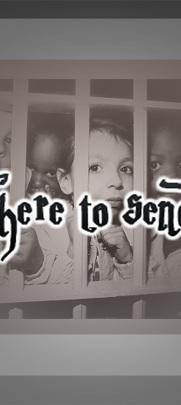 |  |
I have gone into this in some detail because despite all our huge claims about great progress in science, technology, civilisation and all that, the fact of the matter is that when it comes to issues dealing with the complexities of the mind, modern society seems to be going backwards, often rather thoughtlessly. Let me illustrate my point with some specific examples. It may be a bit graphic in part, but if we have to educate people, then we also have to warn them suitably about dangers of inaction as well as wrong action.
I shall start with India where death penalty is still on the books and meant to be awarded for the rarest of rare cases. However, when awarded, the death sentence is never implemented in a hurry. It so happened that about five years ago, a young man was to be finally executed. Since executions had become quite rare and this one was coming after many years, the news media became hyperactive, offering detailed description of the procedure itself. This is absolutely ridiculous. When I was young, a small news item would appear about the prospective execution somewhere in the inside pages of a newspaper, and later a short bland paragraph about the execution itself. Almost invariably, it would be only in the local news papers and seldom became national news. As far the radio was concerned – we had no TV back then – their news bulletin was always too small to carry such news. But on this occasion that I am referring to, the entire media (most of it commercial, by the way) went into a frenzy with computer graphics and what not. And the result of it all was that several kids tried out the procedure and some of them actually lost their lives. As always, the media absolved itself of all blame but here is a case of how society behaves irresponsibly, creating problems for itself.
I now wish to go briefly into the issue of how society deals with violence. From the sixties onwards, movies in India began to include scenes with explicit display of violence as an element of the storyline, and pretty soon, violence began to dominate the entire story and the film. Now it is true that violence does exist in society and even the epics have their quota of violence. Further, scenes depicting violence always had a place in dramatic presentations. But how big is a drama stage and how much graphic violence can one show there? Movies made a huge difference. One could show panoramic shots of violent war scenes as also vivid and graphic close ups; and thanks to camera tricks, many of these scenes could be made to appear pretty realistic.
 |
Now I know many people would protest in all sorts of ways; I have heard them for years, but please bear with me and hear me out. Just imagine how the ambience of society would change when violence becomes a part of the staple diet. I recall one day about thirty years ago when I took an early morning flight from Delhi to Madras. Back then I used to work in a National Lab some 60 km south of Madras city now known as Chennai. And soon as I sat down, I picked up the morning newspaper, made available courtesy of the airline. I scanned the headlines on the front page and turned over to page 2. By tradition, this particular newspaper, a leading one I must say, had little news on page 2 filling most of the space with ads for the movies playing in the leading theatres of Delhi. Most ads carried pictures and what startled me was that in most pictures there was a person holding a gun. In some it was the cop, in some it was the hero, in others it was the heroine, and in a handful, it was even a grandma or a child star. Frankly, I was stunned; I mean was violence the best means of attracting people to films?
Since then, the world has come a long way. We now have violence not only in the movies but even in cartoons. As if this is not enough, there are enough conflicts, wars and acts of terrorism to fill the 24 television news cycle, not to mention the internet to which one can now connect almost anywhere, via simply a cell-phone. And to cap it all of, there are the violent video games, probably now in 3D which once used to attract only teenagers but now seems to have addicts over a wide age span, from almost sixty to six. People play them for hours and hours every day, and yet, there are people who claim that video games do not make a person violent.
Of course, those who wish to market a product would always claim that their products are blameless. Does not the powerful gun lobby in America justify the selling of automatic assault weapons arguing that guns do not kill people but people kill people, flying in the face of all evidence given by their own senior Police Officers and even the FBI, and compelling statistics from UK and other countries where guns cannot be freely bought and carried around? By the way, there is a story in the Ramayana which is meant to illustrate that mere association with a weapon creates bad vibrations and turns the person violent. So this business of the negative impact of association with weapons goes back a long way. But how many remember the remedy that Swami used to prescribe in His Discourses in earlier days? He would remind the audiences that way back, rishis of yore would withdraw into thick forests in order to meditate on God. Were not these forests full of wild animals, snakes and scorpions? Was there not the danger of the snakes and scorpions attacking the rishis and harming them or even killing them? Yes, that danger was certainly present. But, explained Swami, when a person is sitting deep in meditation and communing with God, there is a Divine aura around the meditating sage which radiates positive vibrations of Love. And when wild animals came near the rishis they felt those vibrations, and as a result they became gentle orsathwic and simply moved away, said Swami.
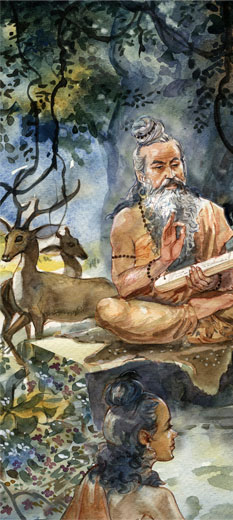 | 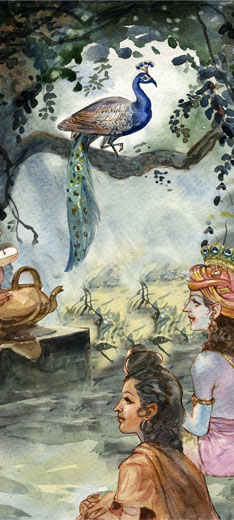 | 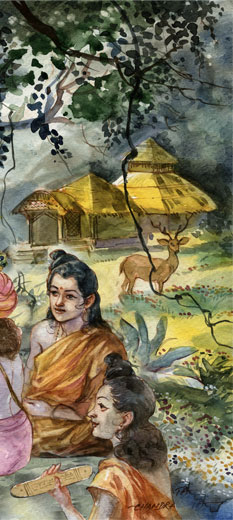 |
| ||
By the way, many years ago, I broadcast a musings on a detailed study carried out by Dr. Mitch Krucoff of Durham University in North Carolina, on the effect of positive vibrations generated by prayer and how they led to the healing of chronic cases. I shall ask our boys to publish the transcript of that along with this, just in case people wish to read it.
From H2H Archive: THE POWER OF PRAYER |
I might add that the BBC did an entire documentary on this particular study carried out by Dr. Krucoff, and I well remember the visit Dr. Krucoff made to Prashanti Nilayam more than a decade ago, with the BBC camera crew tagging along with him.
Listen to Dr. Krucoff's Impressions on Swami's Hospital |
Let me move on and get back to crime and punishment. Most of us who live in bubbles and do not face the incredible difficulties that millions outside the bubble face on a daily basis, in the home, in the community and in society in general, have little idea how inequity affects people. And when crimes occur, we resort to oversimplified black and white theories about how stern and deterrent punishment ought to be awarded so that people think twice about doing violent things again.
Take war, which these days has become exceptionally brutal, thanks to science which always seems to come up with "better and more efficient weapons." All that may be fine in the context of winning wars, but things have changed quite a bit, far more than we realise. Extensive studies being carried out particularly in America are revealing that when soldiers come home from active duty, they have a big problem in adjusting back to civilian society. These are mostly the foot soldiers, who voluntarily join the army, often for financial reasons, and go off to fight when quite young. In a few short weeks of training, their mindset is altered from one of being peaceful to one where they should be ready to attack, fight and kill.
 | 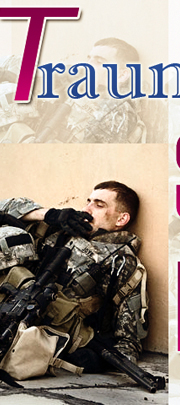 |  |
This they do for a year or more, feel all kinds of trauma which gets bottled up in their minds, come back home, get a great welcome and enjoy a reunion with family and friends. And then slowly trouble erupts. The family [usually the wife and children] are not as warm as earlier, because they have been separated from the man of the house for long.
Many in the civil sector who did not like the war in the first place, avoid the war-veteran who has come back home. Furthermore, out in the field, one had to treat almost everyone one sees as a potential enemy, except of course comrades in uniform. This is home, and people out there in the streets are not enemies; but the hangover is there and readjustment to civilian life and the rules it imposes is difficult.
Add to all that injuries suffered which produce disabilities, the pain caused by unemployment and of course the post-traumatic stress disorder or PTSD which we civilians can never understand, the poor young man finds himself lost between two strange worlds, the home country and the country where he fought. On the battlefront it was nothing but violence; and when he came back, he was not exactly at peace. True there was no war back in the home country. But his mind was full of the social tension he was experiencing while readjusting to civilian life.
A man who goes through such turbulent experience soon sinks into depression, which then rapidly fills his entire life. Some seek a way out via drugs; others withdraw into a fantasy world where they are again fighting an enemy. There is no enemy really because this is home; but the troubled mind provides a screen that converts friends into foes; soon the man picks up a gun and goes on a shooting spree. Alternatively, he takes his own life. In fact, studies have shown that during a certain period, the rate of suicide among returning soldiers was significantly higher than the rate amongst the civilian population itself.
I am terribly sorry to bring all this up. Some people even chastise me about this arguing, "Look, Swami's teachings are all about being sathwic. You are creating a bad impression by talking about negative things." Well, it is easy to be simplistic about serious matters and take a superficial goody-goody attitude. But remember, our mission is not merely to bring the Message of the Lord but also draw in as many devotees as possible to become messengers. And when one goes out into the field, one faces many questions. I have been teaching awareness classes to post-graduate and MBA students for fifteen years and dealt with close to two thousand of them. They all asked sharp questions about life, etc. So, just as a doctor has to know something about the diseases he would have to treat, we who take on the role of being active messengers would have to know quite a lot about how problems arise so that we can clearly explain how Swami's teachings offer the correct and only solution.
 | 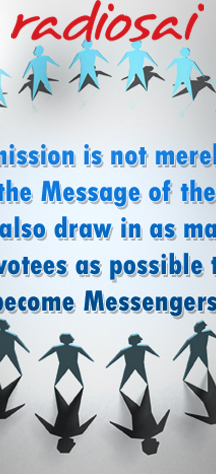 |  |
I think I have said enough to get back to Dani's letter, namely, doing seva in prisons. This is an extraordinarily important activity, for showing kindness and consideration to prisoners can go a long way. In saying this, I am not talking through my hat. I can substantiate this on the basis of two facts. The first of this relates to India's foremost lady cop, Kiran Bedi, now retired. This lady is highly disciplined and absolutely honest and as tough as they come. Naturally, she has had to face her share of difficulties; it is always a pretty tough job to stand up for Dharma. At one point, Kiran Bedi was put in charge of the Central Jail in Delhi known as Tihar Jail.
It was a very difficult assignment, and Kiran Bedi was given that job partly because she was to be 'put in her place' – so the folklore went. But you know what? Being a lady of great discipline and character, she took her job very seriously. As soon as she took charge she found the jail was stuffed to its brim. Built decades earlier for a certain prisoner population, it was now holding four times that number. And a good many of these were being detained indefinitely for absolutely minor crimes like travelling without a ticket in a train and not having money to pay the fine. So she tried her best to cool the temperature. How did she do it? She started meditation classes, held bhajan sessions, and so on. That really helped. This shows that methods based on understanding, compassion and gentleness can work, even in difficult circumstances.
I should add in passing that one Sai seva group in Andhra Pradesh volunteered to work with prisoners in one particular prison. They got permission to do so for one year, and they did a terrific job. I do not know whether they were able to continue. All I know is that the Jail Superintendent was transferred and further that before he left, he spoke glowingly of the Sevadals who worked there. I also know that similar work, wonderful work really, was done in a home for Mentally Handicapped people in Vishakapatnam. I believe H2H once carried an article on that seva, and I request Bishu Prusty who runs H2H to carry that article here again.
IMMEASURABLE SERVICE IN A MENTAL HOSPITAL, VISHAKAPATNAM
|
 | 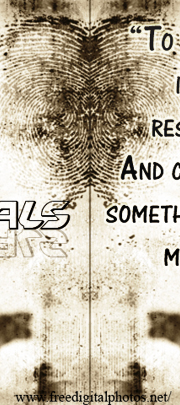 | 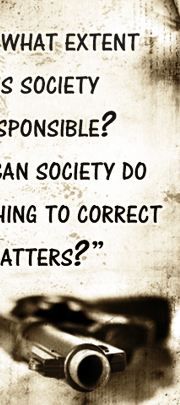 |
I might have talked at length but the point is simple. People who are pushed out for whatever be the reason, hunger for love. Show love to them and they respond very positively. That is a fact. The message that comes out loud and clear is that society must not simply make tough laws, and throw people into jails saying that they are criminals. Given how society is being run these days, we do have to stop for a moment and ask: "To what extent are we responsible? And can we do something to correct matters?" Where handling people with mental problems is concerned, some progress has been made, though not in all countries. I know for a fact that good progress has been made in the U.S. But from what I heard on the BBC a couple of years ago, the situation was pretty terrible in the institutions in most of the countries of Eastern Europe. About India I do not have the facts, but it would not be a surprise if the conditions are pretty much what they used to be decades ago; at least, that is what the Vishakapatnam story seems to suggest.
Going back again to crime and punishment, I wish to make a few more points before I wind up. The first and perhaps the most important of these concerns employment. The more the unemployment in a country, the greater the chance for violent crime, since being without a job for long periods can and does make people highly restless.
Unemployment is closely related to two parameters, firstly, job opportunities and secondly the opportunities young people have to get an education and upgrade their skills. Here, there are some telling numbers from America. Of all countries, the US has the largest prison population in the world, a little over 2 million I understand. And nearly half of this is made up of black prisoners, even though demographically, they form a much smaller percentage of the population. As has been pointed out several times, it costs about $ 9,000/- a year to keep a student in school. And yet, by slashing their education budget, many states have kept these kids out of school. As they grow up, they inevitably come into contact with gangs. In no time at all they get into trouble, get arrested and are incarcerated. At that point, the state spends $ 45,000/- per year on each prisoner. Compare that with spending $9,000 per year needed to educate and prepare them to become useful citizens. The way to bring down the crime rate is quite clear; and yet, when the mind of the public at large itself becomes a prisoner of prejudice, society ends up paying the price.
I do not have the time to go into it in detail, but nevertheless I do have to make a passing reference to a horrific incident that took place recently in a shopping mall in Tucson Arizona, when a 22 year old man sprayed bullets by firing an automatic hand-held gun, killing six I believe and wounding nearly twenty. A lot has been written about that incident, including about the extreme political polarisation in society, about hate speeches, vitriolic rhetoric, etc. As far as the young man is concerned, it would appear that he had a history of mental instability. I heard many psychologists discuss the case and one expert pointed out that around the age of 19 or so, something happens in the brain of many young people that makes them schizophrenic. And in ten percent of the cases, the patient turns violent. However, if people are watchful and society understands the problem, then those likely to turn violent on account of a mental sicknesscan be held in check. Unfortunately, everyone is so frightfully busy these days that few have the time, the patience and the inclination to bother about the problems less fortunate people have, ranging from physical disabilities to little-understood mental problems.
It is time to pause and reflect on where society as a whole is headed right now. With so much stress on aggressive, competitive spirit, winning at all cost, etc., society has lately lost sight of the fact that hundreds of millions are handicapped either due to poverty and/or some kind of ailment. They too are God's children and need love, compassion, help and support. Sadly though, such care and concern are becoming increasingly rare. As Swami says, man is proud of landing on the Moon, but finds it so difficult to go half an inch towards his Heart!
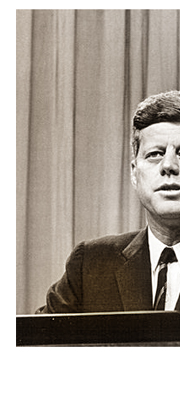 | 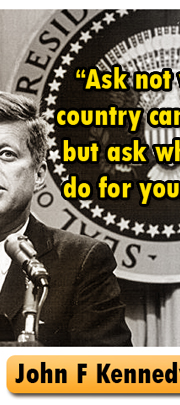 |  |
Which reminds me of a famous remark that John F Kennedy made during his inauguration as President, a statement that was quoted many times as its fiftieth anniversary was celebrated (on January 20, 2011). What Kennedy said was, "Ask not what your country can do for you but ask what you can do for your country!"
And from this was later born the famous Peace Corps that took tens of thousands of young Americans to all parts of the world to do seva with fervour and intensity on a scale never before seen. I remember those days very well. Many I meet here now, had earlier served in the Peace Corp Movement. Few have bothered to notice it, but in a spiritual sense, Peace Corp service rendered was nothing but what the Gita refers to as Nishkaama Karma. What I am driving at is that the teachings that Swami gives us are very practical and universal.
I should also call attention to a prophetic remark made by President Eisenhower, just a few days before the Kennedy inaugural. Ike, as Eisenhower used to be referred to, was retiring as the President to make way for Kennedy; his farewell address also celebrated its fiftieth anniversary recently and was cited several times. In his address, Ike warned that fear mongering could lead to an unhealthy collusion between the armaments industry and the military establishment, leading in turn to the creation of a powerful and moneyed lobby that would be able to literally control the legislative and administrative branches of the political establishment, destabilising democracy as a whole and making the ordinary citizen a mute spectator. The question as to what extent this has happened has been widely debated, but I shall not go into that. But what I must refer to is that Ike worried that such a development, should it occur, would severely affect the spiritual development of America. Frankly, I was stunned to hear the reference to the possibility of spiritual impact in Ike's speech when it was played out recently. But Eisenhower was right. Though they might seem perfectly correct from a worldly point of view, thoughtless worldly actions can often be detrimental to the spiritual development of not only the individual but an entire community.
All of this taken together, tell us the following:
- Negative forces can hijack not only the mind of an individual but can even dull the conscience of an entire nation – this is the warning Ike gave.
- Karma Yoga is not just an academic concept. It is not only very practical but also a game changer. That is what we learn from Kennedy's clarion call and the subsequent experience of the Peace Corps which was very active for decades.
- Insecurity and fear, both of which arise largely from misconceptions, cause society to spend a lot of money unnecessarily on so-called protection. One hundredth of that money spent on spreading compassion can not only deliver a huge return but, most important of all, promote peace.
As Swami sometimes says, "There is no use merely saying Shanti at the end of bhajans. One must roll up one's sleeve, go out there and do something about peace."
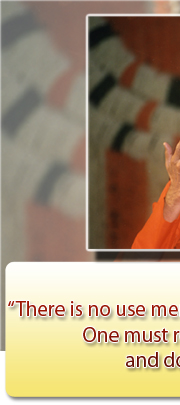 | 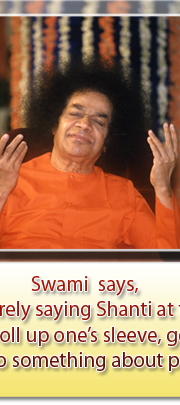 | 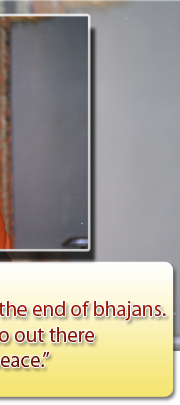 |
In the ultimate analysis, Peace comes from within, namely the Heart, which is the permanent residence of God. What is currently happening is that we shut the door of the Heart, keep God safely inside, and go all over the external world, looking for peace. Sometimes, a thing called peace is produced and dangled before the world. At times the trick is done via negotiations, and at other times it is done with guns. This is not peace but silent tension at best. It is only when compassion and love are released from the Heart that peace would truly prevail. In other words, we must touch base with God within and carry His Fragrance to the world outside.
Swami once asked His students: "What is the difference between Shanti and Prashanti?"Understandably none could answer, following which Bhagavan Baba Himself gave the answer. He said:"Shanti is the peace and tranquillity you experience when you go within and commune with God. When you then move around the world uplifted by that internal bliss, you would radiate nothing but Pure Love, which would touch everyone you come across. That fragrance of Love you radiate into the outer world is calledPrashanti. Obviously, there can be no Prashanti withoutShanti."
The task before us is clear. We must, first and foremost, fill ourselves with Love, and this is something we really owe to Swami, considering how much He has done for us. And having done that, we must then communicate with the world in whatever way we can. Dani whose mail I read out in the beginning is doing a wonderful job spreading Love into dark corners where Love hardly ever reaches. If you think about it, there is a great poverty of Love all over the world, even in countries that may be officially labelled as affluent. However, the situation can be corrected, by us if we wish to. Many are already doing it in their own particular ways, like Dani, for example. But you know, if we join hands, there is a huge magnification that comes from what is called the coherence factor.
So why don't all of you who are listening to this, please go to our detailed Vision Document published just recently, ponder over it and get back to us with your own thoughts, ideas and suggestions? If you have already seen it and responded, then please would you kindly bring that to the attention of others who might not have but would be interested?
Thanking you in anticipation for that help, let me stop at this point and say goodbye for now. There is so much more I would like to share, but not this time.
Invoking the blessings of God on one and all, I end by offering this talk to our beloved Swami.
Jai Sai Ram.
SOURCE: http://media.radiosai.org/journals/vol_09/01FEB11/03-musings02.htm


